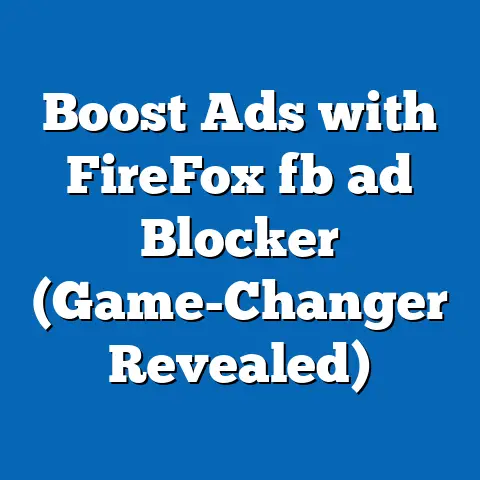Auction vs. Reservation Ads (Maximize fb ad Spend)
Auction vs. Reservation Ads: How to Maximize Your Facebook Ad Spend
The digital marketing landscape is constantly evolving, and Facebook advertising is no exception.
Businesses pour significant resources into Facebook ads, hoping to connect with their target audience and drive conversions.
However, many advertisers find themselves struggling to effectively manage their ad spend, often leading to wasted budgets and underwhelming results.
One of the primary reasons for this struggle is a lack of understanding of the two fundamental ad buying options available on Facebook: auction and reservation ads.
In my experience, the confusion between these two models can be a major roadblock to success.
It’s like trying to navigate a complex maze without a map.
You might wander aimlessly, spending time and resources without getting closer to your destination.
According to recent statistics, a significant percentage of Facebook advertisers admit they don’t fully understand how the ad auction works, and even fewer are familiar with reservation ads.
This knowledge gap can lead to inefficient campaigns and missed opportunities.
Overview of Facebook Ads
Facebook advertising has become an indispensable tool for businesses of all sizes, offering unparalleled reach and targeting capabilities.
From humble beginnings as simple sidebar ads, Facebook’s advertising platform has evolved into a sophisticated ecosystem that allows advertisers to connect with billions of users worldwide.
Ad spend, the amount of money allocated to advertising campaigns, is a critical factor in determining the success of any marketing endeavor.
A well-planned ad spend strategy can significantly impact brand awareness, lead generation, and ultimately, revenue growth.
However, simply throwing money at Facebook ads without a clear understanding of the platform’s nuances is a recipe for disaster.
As I mentioned earlier, Facebook offers two primary ad buying options: auction and reservation ads.
Auction ads, as the name suggests, operate on a bidding system where advertisers compete for ad placements.
Reservation ads, on the other hand, involve purchasing ad inventory in advance at a fixed price.
Each model has its own set of advantages and disadvantages, making it essential for advertisers to carefully consider their campaign objectives and budget constraints before making a decision.
To truly maximize your return on investment (ROI), it’s crucial to understand the mechanics of both auction and reservation ads.
Knowing when to use each model, how to optimize your bids, and how to leverage the platform’s targeting capabilities can make all the difference between a successful campaign and a costly failure.
Key Takeaway: Facebook advertising offers immense potential for businesses, but understanding the nuances of auction and reservation ads is crucial for maximizing ROI.
Auction Ads Explained
Auction ads are the bread and butter of Facebook advertising, representing the vast majority of ad placements on the platform.
These ads operate on a dynamic bidding system where advertisers compete in real-time for the opportunity to display their ads to specific users.
The auction process is driven by a complex algorithm that considers various factors, including the bid amount, ad quality, and estimated action rates.
Let’s delve into the bidding process.
When a user visits Facebook, the platform evaluates which ads are eligible to be shown to that user based on their demographic information, interests, and behaviors.
Advertisers who target that user then enter an auction, where their bids are compared against each other.
The highest bidder doesn’t necessarily win the auction.
Facebook’s algorithm also takes into account the ad’s quality and its estimated action rate, which is the likelihood that the user will engage with the ad (e.g., click, like, comment, share).
I’ve seen firsthand how important ad quality is.
I once ran two identical campaigns, one with a high-quality image and compelling copy, and the other with a generic, low-resolution image and lackluster text.
The high-quality ad significantly outperformed the other, even though the bids were the same.
This highlights the importance of creating engaging and relevant ads that resonate with your target audience.
Advantages of Auction Ads:
- Flexibility: Auction ads offer a high degree of flexibility, allowing advertisers to adjust their bids and targeting parameters in real-time based on performance data.
- Scalability: Auction ads can be easily scaled up or down to accommodate changing budget constraints or campaign objectives.
- Broad Audience Reach: Auction ads provide access to a vast audience, allowing advertisers to reach a wide range of potential customers.
Examples of Successful Auction Ad Campaigns:
- E-commerce Brand: An e-commerce brand used auction ads to target users who had previously visited their website but didn’t make a purchase.
By showing these users retargeting ads with personalized product recommendations, the brand was able to significantly increase their conversion rate. - Local Restaurant: A local restaurant used auction ads to target users within a specific radius of their location.
By offering special discounts and promotions, the restaurant was able to drive foot traffic and increase sales.
Challenges and Drawbacks:
- Competition: The auction environment can be highly competitive, especially for popular target audiences.
- Fluctuating Costs: Ad costs can fluctuate based on demand, making it challenging to predict and manage ad spend.
- Need for Constant Monitoring: Auction ads require constant monitoring and optimization to ensure optimal performance.
Key Takeaway: Auction ads offer flexibility and scalability but require careful monitoring and optimization to navigate the competitive bidding environment.
Reservation Ads Explained
Reservation ads, also known as reserved inventory ads, offer a different approach to Facebook advertising.
Unlike auction ads, reservation ads involve purchasing ad inventory in advance at a fixed price.
This model is typically used by larger brands and agencies looking to secure premium ad placements and guarantee a certain level of reach.
The fixed pricing model of reservation ads provides advertisers with predictability and budget control.
By knowing the exact cost of their ad placements upfront, advertisers can accurately forecast their ad spend and avoid unexpected fluctuations.
This can be particularly beneficial for campaigns with strict budget constraints or those that require a consistent level of exposure.
I’ve worked with clients who preferred reservation ads because they needed to guarantee a certain number of impressions for a specific event.
For example, a movie studio launching a new film might use reservation ads to ensure that their trailer is seen by a large audience in the weeks leading up to the release date.
Advantages of Reservation Ads:
- Guaranteed Inventory: Reservation ads guarantee that your ads will be shown to a specific audience at a specific time.
- Premium Placements: Reservation ads often offer access to premium ad placements, such as the top spot in the news feed or exclusive video slots.
- Predictable Costs: The fixed pricing model provides advertisers with predictability and budget control.
Examples of Successful Reservation Ad Campaigns:
- Major Beverage Brand: A major beverage brand used reservation ads to launch a new product.
By securing premium ad placements during high-traffic periods, the brand was able to generate significant buzz and drive initial sales. - Automotive Manufacturer: An automotive manufacturer used reservation ads to promote a new car model.
By targeting users interested in cars and luxury goods, the manufacturer was able to reach a highly qualified audience and generate leads.
Limitations and Challenges:
- Higher Upfront Costs: Reservation ads typically require a higher upfront investment compared to auction ads.
- Less Flexibility: Reservation ads offer less flexibility in terms of targeting and creative adjustments.
- Limited Availability: Reservation ad inventory is limited and may not be available for all target audiences or ad formats.
Key Takeaway: Reservation ads provide guaranteed inventory and predictable costs but require a higher upfront investment and offer less flexibility compared to auction ads.
Comparing Auction and Reservation Ads
Now that we’ve explored the intricacies of auction and reservation ads, let’s compare the two models side-by-side to highlight their key differences and similarities.
In my experience, the choice between auction and reservation ads often depends on the specific campaign objectives and budget constraints.
If you’re looking to maximize reach and drive performance with a flexible budget, auction ads are likely the better option.
On the other hand, if you need to guarantee a certain level of exposure and have a strict budget, reservation ads may be the way to go.
It’s also important to consider the target audience.
If you’re targeting a niche audience with specific demographics, reservation ads may offer access to premium placements that are not available through the auction.
However, if you’re targeting a broad audience, auction ads can provide a more cost-effective way to reach a large number of potential customers.
Key Takeaway: The choice between auction and reservation ads depends on your campaign objectives, budget constraints, and target audience.
Case Studies
To illustrate the practical application of auction and reservation ads, let’s examine a couple of real-world case studies.
Case Study 1: E-commerce Startup Using Auction Ads
An e-commerce startup selling handmade jewelry wanted to increase their online sales.
They had a limited budget and needed to maximize their ROI.
They decided to focus on auction ads, leveraging Facebook’s detailed targeting options to reach users interested in jewelry, fashion, and handmade goods.
They created a series of engaging ads with high-quality images of their products and compelling copy that highlighted the unique craftsmanship of their jewelry.
They also implemented retargeting campaigns to reach users who had previously visited their website but didn’t make a purchase.
By constantly monitoring their ad performance and adjusting their bids and targeting parameters, they were able to significantly increase their conversion rate and drive online sales.
They found that certain ad creatives and targeting combinations performed better than others, allowing them to focus their resources on the most effective strategies.
Key Takeaways:
- Auction ads can be highly effective for e-commerce businesses with limited budgets.
- Detailed targeting and retargeting are crucial for maximizing ROI.
- Constant monitoring and optimization are essential for success.
Case Study 2: Major Retail Chain Using Reservation Ads
A major retail chain wanted to promote their annual holiday sale.
They had a large budget and wanted to guarantee a certain level of exposure for their ads.
They decided to use reservation ads to secure premium ad placements during high-traffic periods.
They created a series of visually stunning ads that showcased their holiday sale items and highlighted the convenience of shopping at their stores.
They targeted a broad audience with specific demographics, such as age, gender, and location.
By securing premium ad placements, they were able to reach a large number of potential customers and drive foot traffic to their stores.
They also found that reservation ads helped them build brand awareness and reinforce their position as a leading retailer.
Key Takeaways:
- Reservation ads can be highly effective for major brands looking to guarantee a certain level of exposure.
- Premium ad placements can significantly impact brand awareness and sales.
- Reservation ads can be a valuable tool for driving foot traffic to physical stores.
Conclusion
In conclusion, understanding the differences between auction and reservation ads is essential for maximizing your Facebook ad spend and achieving successful marketing outcomes.
Auction ads offer flexibility and scalability, while reservation ads provide guaranteed inventory and predictable costs.
The choice between the two models depends on your specific campaign objectives, budget constraints, and target audience.
As I’ve seen throughout my career, there’s no one-size-fits-all approach to Facebook advertising.
The key is to experiment, analyze your results, and adapt your strategy based on what works best for your business.
By mastering the art of auction and reservation ads, you can unlock the full potential of Facebook advertising and drive significant growth for your business.
I encourage you to evaluate your current advertising strategies and consider which ad model aligns best with your business objectives.
Remember to constantly monitor your ad performance, adjust your bids and targeting parameters, and create engaging ads that resonate with your target audience.
With the right knowledge and approach, you can transform your Facebook advertising efforts from a cost center into a powerful engine for growth.






